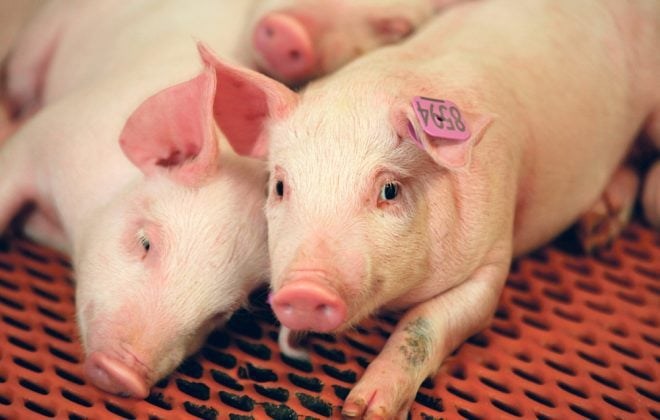PORTAGE LA PRAIRIE, Man. — Manitoba hog farmers are being told to embrace and live the Manitoba Pork Council’s prevailing mantra: “backing up what we say and proving what we do.”
That line, spoken several times by MPC general manager Cam Dahl and other pork council staff and directors, was being promoted as the mindset that offers producers their best defence against public and government criticisms and suspicions.
“I want to make sure we’re actually backing up what we say we’re doing on-farm,” said Mark Fynn, who oversees humane handling for MPC.
“Otherwise we’re building a house of cards or inflating a bubble that’s going to pop if you don’t because it doesn’t match up with what we do on-farm.”
The hog industry, more than other agricultural industries, has faced serious challenges to its viability across Canada and the United States because of allegations that its operations are bad for the environment and inhumane to pigs.
Before the mid-2000s, some manure spreading practices in Manitoba had the potential to cause nutrient runoff into drainage systems and waterways. Those practices were phased out and practices today have little potential for leakage.
Livestock handling practices, such as a growing conversion to open housing for gestating sows and improved pen designs for all pigs, have also seen rapid change since the mid-2000s.
However, that has not stopped activist groups from targeting hog farmers for alleged environmental and animal welfare sins that they claim exist within barns and from farm fields. Some activists also object to the large scale of most modern hog operations.
California is weeks away from imposing Proposition 12 rules that will, in effect, ban most North American pork from the state because of onerous rules on open housing and pen designs that even most open housing operations can’t meet.
And Manitoba’s hog producers are still recovering from a decade of virtual moratoriums on barn construction and expansion that followed mid-2000s attacks on the industry for alleged unsustainable environmental impacts.
“Regulatory risk has the same ability to impact the bottom line as something like disease risk,” Dahl told producers at the council’s Portage la Prairie regional meeting.
He said it was essential for farmers to document and prove that they are doing the things they claim to be doing.
Susan Riese, director of public relations for Manitoba Pork, detailed the state of public concerns with hog production. Environmental and welfare issues are always top concerns for the public, something the organization addresses in ongoing public awareness campaigns.
Particular concerns today are drug residues in meat and antibiotic resistance to human disease created by overuse of veterinary drugs.
Fynn said that farmers’ best protection against unfounded allegations of inhumane treatment is to stick religiously to the hog code of practice, which details approved ways of handling hogs at all stages of production and movement.
“The code is our best defence,” said Fynn.
The PigCare program exists to prove that farmers are following the code. That program has been approved by credible authorities, including regulatory, veterinary and industry experts, so adhering to it and proving that it has been adhered to can be the foundation for intelligent self-protection.
SASKTODAY.ca is Saskatchewan's home page. Bookmark us at this link.

